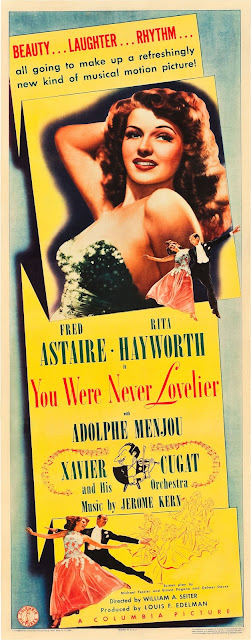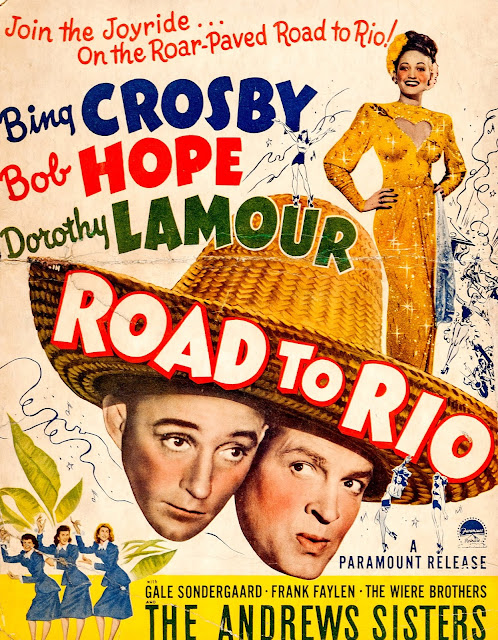Top Ten: Billy Wilder
I absolutely adore Billy Wilder. For me, he is right there behind Alfred Hitchcock. The man totally understands the crazy behavior of humans, therefore he gets comedy and drama like no one else. I admit I haven’t seen all of Wilder’s films, but I’ve seen a good portion of them, so I like to think that I can rightly do a Top Ten list. I also decided that I shouldn’t leave out the films that Mr. Wilder wrote screenplays for before he started directing on his own. His writing was integral to his filmmaking, so I feel it’s only fair. Plus, Wilder himself said he was always a writer first.
10. The Seven Year Itch (1955)
The first time I saw this, I only cared about seeing Marilyn Monroe. I was just starting to get to know her work, so I could’ve cared less about the director, the fact that it had been a Broadway show, who Tom Ewell was…in short, I had some pretty big blinders on. In spite of that, I found the film to be pretty funny, especially the moments when Ewell imagines all sorts of crazy things, be it his past “lovers,” Marilyn spreading horrific rumors about him, or Marilyn falling in love with him as he suavely plays the piano. Those parts are still my favorites in the movie, mainly because Ewell’s pathetic depictions of a Charles Boyer/Cary Grant type are great. Also, I find Marilyn to be a pure delight. Sure, it’s not Wilder’s greatest—it’s not even Marilyn’s greatest. But it’s still fun to watch on a summer night every once in a while.
9. Sunset Boulevard (1950)
Has there ever been a more perfect beginning to a film? Hearing about it secondhand was what really forced me to watch Sunset Blvd, and the screenplay is what brings me back every time (William Holden isn’t a complete eyesore, either). You’ve got the deconstruction of Hollywood and its stars, multiple quotable lines, great cinematography, the coolest and wittiest voiceover that Bogart never did, and an outrageous performance from Gloria Swanson. Not to mention all of the real-life references made in the film: Cecil B. DeMille’s cameo; his history of directing Swanson; von Stroheim’s directorial history; the use of the unreleased Queen Kelly that was directed by von Stroheim and starred Swanson; the card game with silent screen stars… The film is obviously a must. However, I don’t watch it nearly as much as I do, say, The Major and the Minor, because it’s a little too depressing for me. Watching Norma Desmond live a delusional fantasy that ultimately brings Joe Gillis to his death right before he can catch his “happy ever after” with Betty is upsetting for a romantic like me.
8. Double Indemnity (1944)
Arguably the movie that defined film noir, Double Indemnity is the best of the best. Adapted by Wilder and Raymond Chandler from the James M. Cain novel, this film commands a level of cynicism, wit, irony, and surprising humanity that is hard to beat. Its casting went against type by choosing the amiable Fred MacMurray for the role of Walter Neff, an insurance man who gets distracted by an ankle bracelet and agrees to participate in murder. Neff may be a murderer, but he also has a certain degree of naivety concerning his treacherous partner in crime, Barbara Stanwyck’s Phyllis Dietrichson. Stanwyck is marvelous—but then what do you expect from such an incredible actress? Edward G. Robinson’s Barton Keyes is what keeps the film from becoming too hard-edged. Keyes’s fatherly relationship with Neff is actually touching, justifying the script’s decision to concentrate the last scene on the pair.
7. Ball of Fire (1941)
Watch Gary Cooper’s shy and naïve Professor Bertram Potts and tell me that you’re not in love. Directed by the great Howard Hawks, but written by Wilder and his (first) longtime collaborator Charles Brackett, Ball of Fire hits all the marks for me. You want hilarity? Watch Stanwyck’s “Sugarpuss” O’Shea teach the professors how to dance. Craving a kissing scene that’s too adorable to handle? See Sugarpuss explaining “yum-yum” to Potts. How about a scene that twinges your heart with its vulnerability and sweetness? I direct you to Prof. Oddley telling Potts and his friends about his late wife, leading the professors to thoughtfully sing “Sweet Genevieve” for their friend. If that’s still not warm enough for your ice-cold heart, look at Potts’s proposal to Sugarpuss. What, that's too much? Fine then, listen to Sugarpuss tell her gangster boyfriend (played nicely by Dana Andrews) that she won’t marry him no matter what because she’s in love with Pottsie: "I love him because he's the kind of guy who gets drunk on a glass of buttermilk, and I love the way he blushes right up over his ears. I love him because he doesn't know how to kiss, the jerk!"
6. Ninotchka (1939)
Let’s be real: people’s first reason for watching this film will probably always be Greta Garbo, which isn’t a bad thing. She consistently fascinates me in everything she does, as I’m sure she does to a lot of people. Considering how elusive and somber her image was made out to be, seeing her belly-laugh at Melvyn Douglas is a complete delight (that is, if you haven’t seen her previous films, where she does in fact smile and laugh her fair share). Her presence undoubtedly gives Ninotchka a huge lift in its reputation, but we can’t forget Douglas’s own fantastically hilarious portrayal, Ernst Lubitsch’s ever-present creativity, or Wilder, Brackett, and Walter Reisch’s sharp script. Am I right, comrades?
5. The Major and the Minor (1942)
Wanting to take control over his scripts without directors mucking them up, Wilder studied Hawks during Ball of Fire in preparation of his own directorial debut, which was just a year later in The Major and the Minor. Although the film isn’t a through-and-through “Billy Wilder picture,” it’s still a great first outing. Ginger Rogers plays Susan Applegate, a woman who’s decided she’s had enough of New York City and wants to go back home to Stevenson, Iowa. Unfortunately, ticket fares have gone up and the money she’s specifically saved for a ticket home is no longer enough, so she hatches the idea to pass herself off as a 12-year-old in order to purchase a ticket for half-fare. Her ruse is discovered after she’s found smoking by the already-suspicious train conductors, forcing her to hide out in a drawing car that turns out to be occupied by Major Kirby (Ray Milland). From there it just escalates. I admit that the plot is absurd, but it’s a Billy Wilder comedy—lighten up. I know some people throw fits about Susan and Major Kirby’s romance, but it’s never obscene or pedophilic as some are quick to claim. I don’t want to start ranting, so I’ll just say watch the film. It’s wonderful, subtle, and hilarious.
4. Love in the Afternoon (1957)
Like The Major…., people like to complain about this picture’s central romance between Audrey Hepburn and Gary Cooper. Yes, Cooper was older, and yes, it does show, but pay attention to the actual relationship being presented instead of judging it based on people’s looks. While Wilder was surprised at how old Cooper suddenly seemed when he arrived on the set, his part does call for him to be an aging playboy who finds himself falling for a young and totally inexperienced woman. The whole obstacle to their relationship is Hepburn’s sheltered life trying to co-exist with Cooper’s lifestyle of booze and torrid affairs. Music plays such an interesting and vital part to the film too. And let me just say that Maurice Chevalier gets to be the best dad on celluloid ever. His interactions with Hepburn are just so sweet (“I love you, Papa.” “I love you more.”).
3. The Apartment (1960)
This is the ideal mixture of sugar and spice, comedy and drama. As you can tell, I’m more into lighthearted fare (most of the time anyway), so I was a little surprised when I first saw The Apartment and realized it wasn’t going to be another Some Like it Hot. Shirley MacLaine and Jack Lemmon are tender, vulnerable, heartbreaking, and just a touch bitter. You go from MacLaine trying to commit suicide to Lemmon straining spaghetti on a tennis racket. Fred MacMurray does some of his best work here, too. And let’s never forget “Shut up and deal.”
2. Sabrina (1954)
I’ve said it before, but I’ll repeat it in case you forgot: I think Sabrina is practically perfect. It’s witty, funny, romantic, and just idyllic for any mood you’re in. Although I’ll always wonder what Cary Grant would have been like as Linus, I love seeing Bogie in an honest-to-goodness romantic comedy. William Holden is great too, but we all know who Sabrina belongs to—Audrey Hepburn. She’s just filled to her fingertips with grace, charm, and all the other clichés. This film is really the fairy tale to end all fairy tales.
1. Some Like it Hot (1959)
Nobody may be perfect, but Some Like it Hot is. Marilyn Monroe is stunning (and shows that a woman with curves is a wonderful kind of woman!). Her musical numbers are like icing on an already delicious cake. And of course, Tony Curtis and Jack Lemmon have the most amazing chemistry, throwing out lines and little pieces of physicality that really bring Joe/Josephine and Jerry/Daphne to life. I also love Wilder’s casting of George Raft, Pat O’Brien, and Joe E. Brown. The guys get to sort of reprise their defining roles from the beginning of their careers, similar to what Wilder did with Sunset Boulevard. Every time I show this film to a friend, they fall in love with it. Isn't that what the movies are all about?
Just a quick heads-up: this month is going to be crazy for me, so I'm taking a very short hiatus. I have four papers to work on, along with two final exams to prepare for, as well as packing up my apartment for the summer. I'll try to get back here as soon as I can, but please be patient. I should be posting again by at least mid-May.
With love,
Michaela




.jpg)

_-_movie_poster.jpg)













I love Billy Wilder. He's one of my idols. The Apartment is my favorite movie of all time.
ReplyDeleteHe's a worthy idol to have! The Apartment will always be near and dear to me -- it's so incredible. Whenever I watch today's romantic comedies, I think "Billy Wilder did it so much better" or "They stole that from Billy Wilder!" I recently saw Woody Allen's latest, Cafe Society, and there was a small plot twist that immediately brought to mind The Apartment.
Delete